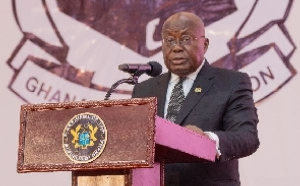 President Nana Addo Dankwa Akufo-Addo
President Nana Addo Dankwa Akufo-Addo
The President, Nana Addo Dankwa Akufo-Addo, has cautioned political parties against declaring election results ahead of the declaration by the Electoral Commission (EC) during the upcoming December 7 polls.
According to the President, it is only the EC that is mandated to declare the official election results, stressing that “this is crucial to maintaining peace and stability during and after the elections”.
“Political parties must refrain from declaring election results before the EC does so, as this can lead to confusion, misinformation and even potential conflicts”.
“The EC’s role as an impartial and independent body ensures that its results reflect the will of the people, free from partisan influence…this assignment of responsibility is essential to maintaining public trust in the electoral system and to prevent any undermining of democracy through the spread of unverified or false election outcomes.”
He was speaking at the 2024/2025 Annual General Conference of the Ghana Bar Association (GBA), held at the Great Hall of the Kwame Nkrumah University of Science and Technology in Kumasi on September 9, 2024.
Among the dignitaries that graced the occasion on the theme, “Peaceful, free, fair and transparent election-The key to sustainable democracy,” was the Asantehene, Otumfuo Osei Tutu II.
He said, “It is imperative that the EC remains the sole authority responsible for declaring election results, to preserve the integrity and credibility of the electoral process…. ”
The President also underscored the vital role of the EC in safeguarding the integrity of the electoral process.
“The EC, as the body charged with overseeing the electoral process, must act with impartiality, independence, and integrity, ensuring that the election process is fair to all parties,” President Akufo-Addo stated.
The President dismissed claims that vote rigging was the only way by which the New Patriotic Party (NPP) could retain power in the upcoming December polls, adding, “It’s impossible to rig elections”, and reiterated that “vote rigging is not in the party’s DNA”.
On corruption, the President said “We’ve also taken strong, systemic steps to combat corruption, rooted in a holistic programme of legislative, administrative, financial and technological reforms. We’ve established the Office of the Special Prosecutor, a critical institution in the fight against corruption, and we’ve provided them with the necessary tools to prosecute those who seek to enrich themselves at the expense of the Ghanaian people.”
He noted that his government has been widely criticised for its failure in the fight against corruption, with critics, civil society organisations, the opposition National Democratic Congress (NDC), and a section of Ghanaians raising concerns about the impact of the issue on national development.
The President of the GBA, Yaw Acheampong Boafo, urged the government to reconsider the Free Senior High School (SHS) policy.
He proposed that students from affluent families should pay fees in addition to the government focusing on improving basic education and directing resources towards supporting students from disadvantaged families, rather than subsidising secondary education for those who could afford it.
“The Free SHS programme should be means-tested, using data from the National Identification Authority, so that wealthy parents do not present themselves as peasant farmers, reminiscent of the days when we had the COCOBOD scholarship scheme,” he said.
He said the country needed to prioritise investment in public basic schools, eliminate ‘schools under trees,’ and provide sanitary pads for girls from poor families before committing extensive funds to secondary education.
Mr.Boafo also expressed concern over the allocation of government scholarships based on political affiliations rather than merit.
“It is immoral and troubling that government scholarships are given to individuals with political connections, depriving brilliant but needy students of opportunities.”
Mr. Boafo further questioned the allocation of foreign currency scholarships for programmes that could be pursued at local universities and called for a review of the scholarship distribution system to ensure fairness, transparency, and accountability.
The Attorney General and Minister of Justice, Godfred Yeboah Dame and the Chief Justice, Gertrude Araba Esaaba Sackey Torkonoo, were among other speakers.
